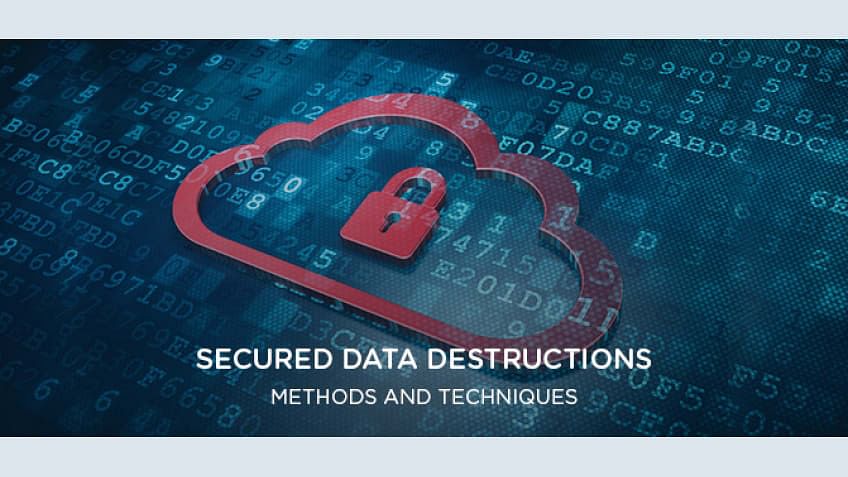How Robust Data Destruction Improves Your Overall Cyber Security Procedures
How Robust Data Destruction Improves Your Overall Cyber Security Procedures
Blog Article
The Important Nature of Information Damage in Upholding Computer Safety Services and Protecting Against Unauthorized Gain Access To
In an age where information breaches and identification burglary are progressively widespread, the importance of efficient information destruction can not be overemphasized. Numerous techniques, from information cleaning to physical destruction, serve as essential safeguards against unauthorized accessibility.
Importance of Data Damage
In an increasingly digital globe, the relevance of data destruction can not be overemphasized. As companies amass vast quantities of sensitive information, the possible repercussions of stopping working to correctly manage and get rid of of that information become progressively severe. Data breaches, identification burglary, and company espionage present significant risks, highlighting the need of reliable information devastation practices.

Furthermore, as modern technology develops, so also do the methods through which destructive actors look for to exploit delicate information. Organizations must remain alert and positive in their information destruction methods to safeguard against these progressing threats. By prioritizing data devastation, firms not only safeguard their properties yet also foster depend on amongst stakeholders and customers, demonstrating a dedication to accountable information administration and security practices.
Techniques of Effective Data Damage
To make certain the irreversible and complete damage of delicate information, companies can utilize a selection of reliable approaches customized to their details needs. One of the most typical techniques is data wiping, which includes utilizing specialized software application to overwrite existing data several times, making healing basically impossible. This is especially helpful for difficult drives and solid-state drives, where conventional deletion methods are poor.
An additional reliable technique is degaussing, which uses strong electromagnetic fields to disrupt the magnetic domains on storage space media, providing the information irretrievable. This technique is particularly fit for magnetic storage space tools, such as tape drives and difficult disks.
Physical devastation is likewise a viable choice, involving the shredding, squashing, or incineration of storage space tools. This method warranties that information can not be recuperated, making it optimal for organizations taking care of very sensitive details.

Compliance With Information Protection Rules
Organizations have to not only concentrate on efficient data devastation approaches but also ensure conformity with data protection guidelines that regulate exactly how delicate details is handled and disposed of. Complying with these regulations is crucial for maintaining and guarding personal information consumer trust. Rules such as the General Data Defense Policy (GDPR) in the European Union and the Health And Wellness Insurance Transportability and Liability Act (HIPAA) in the United States enforce rigorous standards on data monitoring, which include requirements for the secure disposal of delicate details.
To achieve compliance, companies need to execute extensive information destruction plans that straighten with these lawful frameworks. This consists of determining data that requires devastation, developing protocols for safe methodsâEUR" such as shredding physical media or using software program that satisfies market standards for data wipingâEUR" and keeping in-depth records of destruction tasks. Routine audits needs to be carried out to guarantee adherence to these plans and to determine any type of possible locations for renovation.
Failing to adhere to data security guidelines can cause considerable legal ramifications, including hefty fines and damages to a company's online reputation. Incorporating compliance right into data damage methods is not only a legal commitment however additionally an essential component of a durable info security method.
Repercussions of Poor Data Handling
Poor data handling can cause extreme consequences that prolong past immediate operational obstacles. Organizations might encounter considerable financial losses as a result of information violations, which frequently lead to costly remediation initiatives, lawful charges, and regulative fines. These economic implications can impede and strain sources development, ultimately influencing a company's bottom line.
Furthermore, bad data handling can severely damage an organization's credibility. Companions, stakeholders, and consumers might shed count on an entity that falls short to protect sensitive info, leading to decreased consumer loyalty see here now and potential loss of business opportunities. This erosion of count on can take years to restore, if it can be recovered at all.
Additionally, companies could encounter legal ramifications occurring from non-compliance with data protection policies. Such offenses might lead to fines and investigations, compounding the financial problem have a peek here and further tainting the organization's image.
In the realm of cybersecurity, poor data management practices can produce susceptabilities that make systems much more prone to unapproved access and cyberattacks. Inevitably, these repercussions emphasize the important significance of implementing durable information handling treatments to protect sensitive details and keep business honesty.
Best Practices for Secure Data Disposal


Firstly, data must be categorized according to its sensitivity. Sensitive details calls for extra strenuous disposal techniques, such as shredding physical documents and utilizing sophisticated software application for electronic information wiping. Using licensed data devastation services ensures conformity with industry regulations and criteria.
Secondly, organizations must carry out a data disposal plan that mandates regular audits. This policy should describe the treatments for data retention and damage, making certain that obsolete information is disposed of quickly and safely. Training workers on these procedures is important to promoting a society of protection understanding.
Last but not least, keeping comprehensive records of disposed data boosts liability and provides a clear audit path. This documents should include the kind of data ruined, the technique used, and the day of disposal.
Verdict
Finally, the critical of effective data devastation appears in its duty in boosting computer security services and alleviating unapproved accessibility dangers. Taking on robust approaches such as data wiping, degaussing, and physical destruction, along with conformity with policies like GDPR and HIPAA, is vital for safeguarding delicate info. Disregarding appropriate information disposal practices can bring about serious repercussions, consisting of data breaches and legal repercussions. Executing finest practices in safe and secure information disposal ultimately strengthens business integrity and client depend on.
In a period where data breaches and identification theft are progressively widespread, the relevance of effective data devastation can not be overstated. data destruction. Data violations, identification theft, and corporate reconnaissance posture significant threats, highlighting the need of efficient information useful content destruction practices
Conformity with guidelines such as GDPR and HIPAA requireds that organizations execute rigid data defense measures, including the secure damage of data at the end of its lifecycle.
By focusing on information damage, business not only secure their properties but additionally foster trust among stakeholders and clients, showing a commitment to accountable data monitoring and safety techniques.
Organizations must not just concentrate on reliable information devastation approaches yet also make sure compliance with information defense policies that control exactly how delicate details is taken care of and disposed of.
Report this page